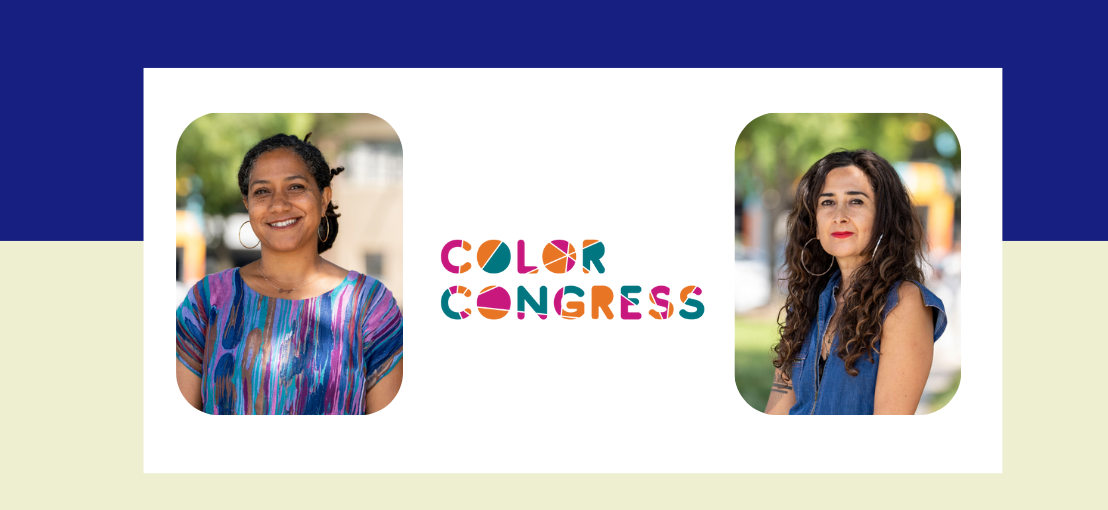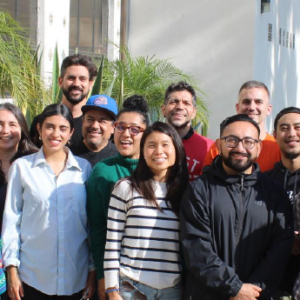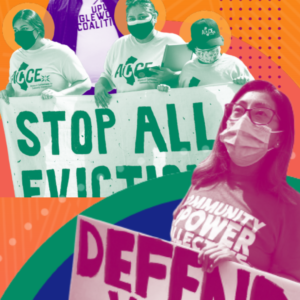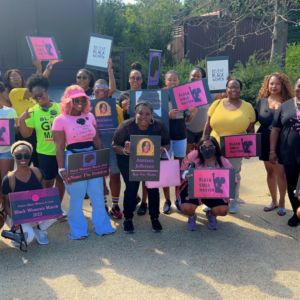Cultural and Narrative Power Building: Celebrating Color Congress’s Work Supporting the Ecosystem of Filmmakers of Color

Color Congress is at the forefront of efforts to grow the narrative and cultural power of people of color, ensuring real, true stories about our lives and experiences are being told.
In its two and a half years, the collective has focused on building a strong and vibrant ecosystem of organizations committed to nonfiction storytelling by, for and about people of color. In the last year alone, the 100+ members of Color Congress served more than 15,000 documentary filmmakers and more than 10,000 documentary film professionals.
Since 2021, Common Counsel Foundation has served as a fiscal sponsor and provided operational capacity to Color Congress. Our role as an incubator helps build the capacity of social justice organizations so they can continue to deepen and expand their organizing and movement- building work.

Recently, Color Congress released The People of Color Documentary Ecosystem: Engines for a New American Narrative, a report about this ecosystem, the importance of their work in a democratic society, and how philanthropy can pivot from divestment into supporting their power-building efforts and narrative-shifting results.
Sonya Childress and Sahar Driver are the co-directors of Color Congress, which has cultivated this robust ecosystem of people of color-led and serving organizations in the documentary space. We had the opportunity to talk with them about their work and the role of documentary film in cultural and narrative power building.
It was an intriguing and exciting conversation connecting the dots across power and politics, culture and arts. We are thrilled to spotlight their work and hope you will read more about their collective efforts.
What is your favorite part of your work and the work of Color Congress?
Sahar: The thing that gets me up in the morning and excited about Color Congress is creating a container not only for connection among members and connecting to resources, but creating an incubator for shared solutions that our members are co-constructing. That is really special. People are often refining their understanding, naming problems and solutions, but in many spaces where that happens there isn’t an infrastructure in place to incubate and build those solutions. We created that container, and that makes me really excited about this work.
Sonya: I am not a filmmaker but I have been working in this sector for over two decades. I’m a fan of doc films and a believer in the role of film and arts more broadly in educating and activating people, and painting a portrait of a world we all want to live in. What I enjoy about this work and this field, is that Color Congress is at the intersection of art and organizing. Much of what we do is organizing leaders of documentary organizations. These organizations are working with artists and organizing them to step into the power we believe they hold. That intersection is my happy place.
What do you want more people or funders to understand about narrative and cultural power building?
Sahar: I really want folks to understand how valuable the nonfiction storytelling form is. In movement building, in culture building, it is one of the most trusted forms of media that exists for a reason. Historically, independent storytellers have been committed to telling honest stories with the potential for impact –- to make change one way or another. This kind of storytelling is powerful; this is why social movements use this form to articulate the importance of their work.
It’s a form where you’re able to see movements in the making over long periods of time and a form that provides a historical record. We recently came across a quote, from Chilean filmmaker Patricio Guzmán, “A country without documentary films is like a family without a photo album.” That is the context we find ourselves in now where there is a need for counter history from the perspective of people who are often sidelined that sheds new light on the present moment that we find ourselves in.
Carlos Gutiérrez of Cinema Tropical, one of our members, recently shared this idea, that film is a social experience, you come to a TV screen to watch a series by yourself or with a family at most, but you go out into the world often to watch films in community. It creates a space of connection with the themes and connection with the people around you. Film is unique in that it allows people to create connections that are essential building blocks to organizing. And these often get overlooked when we think about it as only representation. We are creating a container, the space-making opportunity with film is something we think about. We don’t think about it in a one-directional way.
Narrative power is something we hear a lot about in philanthropy, but if you ask the definition of narrative you will likely get different answers. Is there a simple way you describe narrative or narrative power?
Sonya: Sahar and I worked as Impact Producers, which is similar to organizers. We maximize impact and reach of film, and embed it into ongoing organizing efforts or to spark new organizing. We spent a lot of time thinking about the power of a single film. If we take a moment and imagine a film is a drop of water, a narrative is a wave. That helps us think about the potential impact of many films, a lot of storytelling, a lot of art making, that is all around a single issue area or theme, that’s how we think about it. Not the power of a single piece of art, but a wave of art and storytelling that brings nuance and heft to an idea.
Though we aren’t working with individual filmmakers, we are working with 112 documentary film organizations, who are supporting tens of thousands of filmmakers. They have huge potential in how they orient those filmmakers towards ethical nonfiction, the storytelling they encourage those filmmakers to do, the way they orient filmmakers into the world. If they encourage everyone to make a film about a particular topic at a particular time, that could create a huge wave, and we’re so excited about that potential.
Sahar: Narratives, which are how we make meaning in the world, are often defined by who gets to tell those stories; they only change when you start to change who is telling those stories. Narratives disrupt or advance. When people whose voices are marginalized get to tell stories, they get to advance different narratives, counter narratives, that’s when things can change.
The organizations we support care that filmmakers of color have agency in making meaning, in telling the stories that they wish to tell. That is so important when we talk about narrative change and narrative power.
Narratives, which are how we make meaning in the world, are often defined by who gets to tell those stories; they only change when you start to change who is telling those stories. Narratives disrupt or advance. When people whose voices are marginalized get to tell stories, they get to advance different narratives, counter narratives, that’s when things can change.
Sahar Driver, Co-Director, Color Congress
Do you see this as a complementary power or catalyzing power to the power building done in organizing?
Sonya: When we think about the arts in the social justice ecosystem, art has always been a valuable tool for education and activation. Serving as an intermediary, Color Congress can provide funding for technical assistance, shared analysis, and power building. That is useful in any sector.
We’re organizing a sector and helping them maintain their passion, their leaders, and build durable organizations that can withstand political and economic highs and lows. The foundation of strong democracy requires an educated and engaged populous – and we are engaging a sector that does that.
We’re organizing a sector and helping them maintain their passion, their leaders, and build durable organizations that can withstand political and economic highs and lows. The foundation of strong democracy requires an educated and engaged populous – and we are engaging a sector that does that.
Sonya Childress, Co-Director, Color Congress
In a time with streaming, reality tv, true crime, what are the implications of shrinking attention spans and this form of entertainment non-fiction? How do you talk about the imperative of this work – or how do you reframe that question and presumption?
Sahar: There’s a thing that happens when an essential component of society –- think about health care, schools, any critical social infrastructure –- when it gets commercialized, it’s emphasis and power shifts. When thinking about the commercialization of this form, we are talking about what happens when the means of distribution prioritize entertainment-fare over socially critical perspectives? We are not putting one over the other –- documentaries on food, sports, and more, but there is an important role for independent storytelling about social concerns and our history and political content.
Sonya: I agree, to add to Sahar’s point, part of what we lose in the conversation about nonfiction being recast essentially as an apolitical arm of entertainment, is that celebrity fare is quite political, often connected to a consumerist aim. True crime is political, it often undergirds our investment in the current criminal legal system instead of critiquing it. Even though we’re looking at how it’s been defanged as commercial players have dominated the form, there is no doubt documentary film is quite political and has always acclimated people to a political point of view.
Color Congress will be its own independent nonprofit in 2025. What would you share about the partnership with Common Counsel Foundation and moving into this next phase?
Sahar: When we were first launching we did a scan of possible organizations we could partner with as our fiscal sponsor. There were a few things that made Common Counsel Foundation stand out. The commitment through and through to be accountable to movements, Common Counsel Foundation stood out to us as a very values-driven organization. It was also emphasized early on, to not see the foundation as a forever partner, but as an organization that was going to position Color Congress to become independent to get there in our own time. To think about building that capacity –- that was a valuable orientation to the role that Common Counsel Foundation plays.
Sonya: It has been so important to be incubated by a values-aligned organization, with not only the wisdom of how to support progressive nonprofit organizations, but being so generous with their time. We benefit from the work Common Counsel Foundation is doing with so many other organizations that we respect, and couldn’t have picked a better partner.
Learn more about Color Congress.




